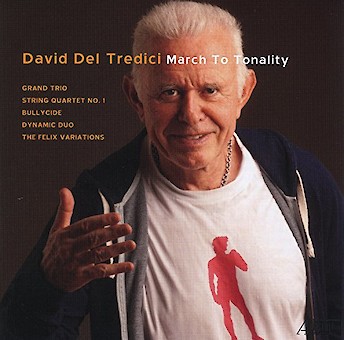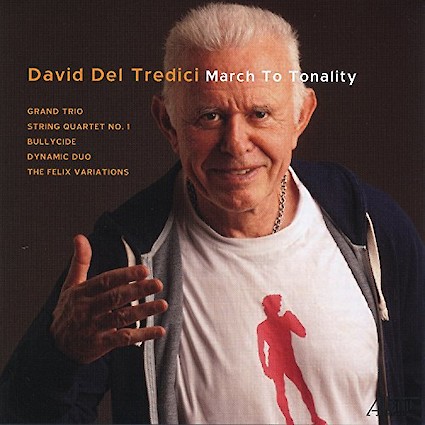Five World Premiere Recordings to be issued on Albany Records
10/2/2017
for violin, cello and piano
If only because of its length (more than thirty minutes), my first piano trio might be called "grand." Grandeur, however, is surely less a matter of length than a question of character — here, an extravagant neo-romanticism. Accordingly, the work unfolds dramatically, demands the utmost virtuosity of its performers, and ultimately glories in largeness of gesture and immediacy of sentiment.
The violinist and cellist frame the first movement (Aria I) with two Herculean cadenzas, giving the work a concerto-like quality. In double octaves, they go on to sing a boisterous main theme, soon to be contrasted with a grazioso second theme featuring the piano. After energetic development of both themes, the second cadenza brings the movement to an unexpectedly quiet close.
Aria II, marked lento, is no less intense than Aria I. It is marked by a more sustained lyricism, tinged by disquietude and pain in the form of a throbbing note (F-flat) that permeates the texture.
The bravura Fuga that follows is the dramatic climax of the work. A slithering chromatic theme, first articulated in the violin, progresses inexorably through all three instruments. It develops intricately and extensively, hurtles towards a near-demonic finish...then vanishes.
The concluding Reminiscence is the calm that follows the storm. The first movement's energetic theme, now transformed, reveals a sweeter, more loving — more amabile — essence.
Begun during a sublime mid-August 2001 sojourn at the Rockefeller Foundation's Villa Serbelloni on Lake Como, my Grand Trio was completed back home in New York City three traumatic months later.
Inspired by the boldness, virtuosity, and open-heartedness of their playing, the Grand Trio was written for, and is dedicated to, the grandest trio I know — Joseph Kalichstein, Jaime Laredo and Sharon Robinson.
March to Tonality presents a David Del Tredici with whom listeners may be less familiar. Rather than the action-packed vocal and large ensemble music that is his calling card, this collection of chamber works, all recorded for the first time, showcase Del Tredici’s dense, dramatic writing for chamber forces.
The double-album opens with Del Tredici’s Grand Trio. The rippling energy of the opening figure from pianist Steven Beck sets the pace for the first three movements, which are all played attacca. Throughout this thirty minute climb, Del Tredici recontextualizes several familiar musical fixtures in their synthesis. As the work unfolds, moments reminiscent of Mozart, Mahler, and Mingus flow together elegantly, building towards the dramatic climax of the work, which (of course) is a fugue. The work closes with its shortest movement, Reminiscence – Allegretto amabile. Aptly titled, this movement looks back on the the rest of the work with a nostalgic, rose-tinted filter.
String Quartet No. 1 occupies the final three tracks of the first album. Innocence and Experiencecontain many tender moments, but the heart of this work is in the third movement, Grosse Tarantelle. This final third moment is nearly twice as long as the first two movements combined, and sustains the ecstatic energy of the opening throughout the entire movement. Even as the music slows later in the movement, one still hears vestiges of the opening figure rippling through the ensemble.
The tragic story of teen suicides inspires another of the pieces. Exactly halfway through Bullycide, the names of five young people who took their lives due to bullying are whispered. Again, in another work, an overtly emotional moment like this might betray the material that both precedes and follows it, but both Del Tredici’s pacing and the intimacy of the ensemble’s playing allow this to be the piece’s highpoint.
Not to be overlooked in the midst of the other, significantly larger, pieces on this double album, the chemistry of violinist Mark Peskanov and bass trombonist Felix Del Tredici brings this unusual combination together seamlessly in Dynamic Duo. While the Batman reference is (presumably) unintentional, it is still somewhat apt. In Del Tredici’s Dynamic Duo, the bass trombone is a clear leader, outfitted with equipment and skills to boot. Del Tredici presents a broad spectrum of possibility for this instrument through mutes and extended techniques, including singing through the instrument to create a haunting, metallic echo of the human voice.The final track, The Felix Variations, showcases Felix Del Tredici in a solo format. Initially unsure what else the bass trombone had to offer, each variation seemed to scold my lack of imagination, presenting a rich palette of colors and textures while never compromising expression for effect.
Grand, never gauche, and cunning without camp, Del Tredici toes a fine line in embracing a postmodern aesthetic without the emotional separation of irony. The constant rise in dramatic tension across the first half-hour of the Grand Trio, the disproportionate length of the finale of String Quartet No. 1, and the use of a myriad extended techniques in Dynamic Duo and The Felix Variations all prove powerfully expressive. March to Tonality is a longer play, but didn’t out stay its welcome.


